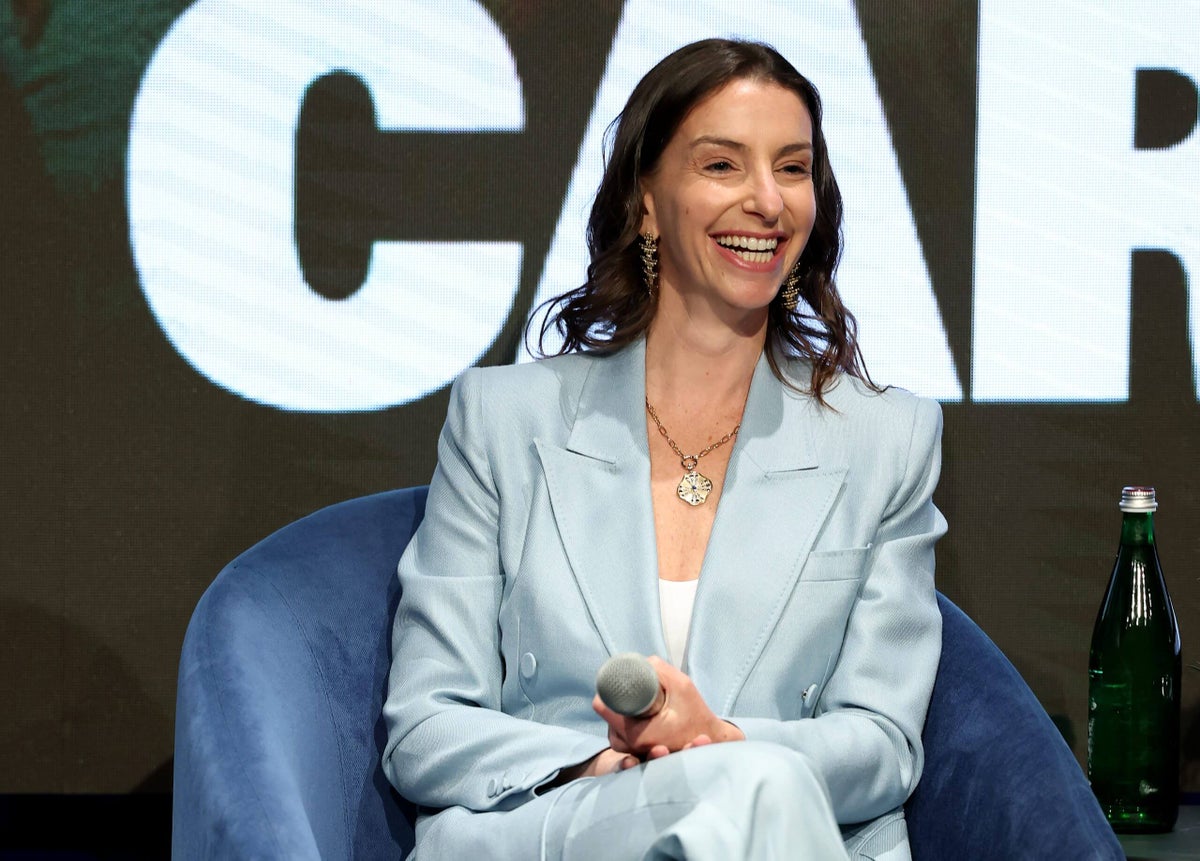Don’t ask Carolyn Tisch Blodgett where to eat in New York. Though she was born and raised in the city, she won’t have an answer for you. She never goes out to dinner. Instead, the Gotham FC governor and lead owner mostly eats stadium food.
Not metaphorically. Literally.
“I really never go out to dinner,” she tells The Athletic. “I mostly just eat stadium food because stadiums are so much a part of my life and my identity.”
Tisch Blodgett, her three children and her extended family enjoy the concessions that the Sports Illustrated Stadium hospitality section offers, a tradition that started almost 30 years ago.
As a kid, Tisch Blodgett spent Sundays at New York Giants’ NFL games with her grandfather, Bob Tisch, the co-founder of Loews Corporation, who became co-owner in 1991. Her weekend started on Saturday, when she baked a Giant-themed cake.
On Sunday mornings, she would wake up early, get dressed to the nines (Mr Tisch expected everyone to dress professionally; he said they all represented the team), and haul her cakes to the family’s box at MetLife Stadium.
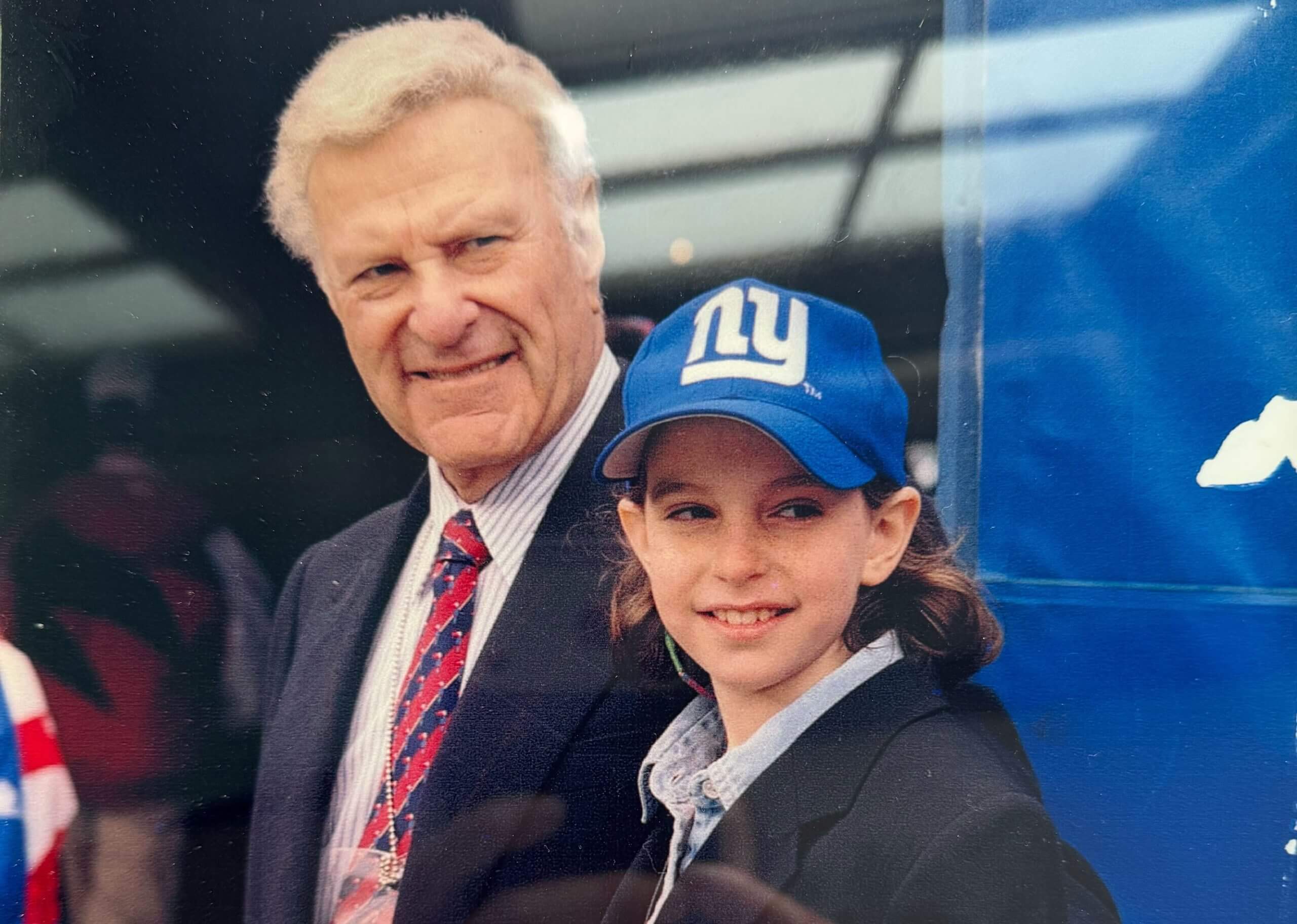
Carolyn Tisch Blodgett and her grandfather, former New York Giants owner Bob Tisch. (Laurie Tisch)
“I was always with my grandfather and he saw a lot of himself in me,” she says. “I was passionate about football, but I really was more passionate about what football did to a community, how a team would bring people together through thick and thin.”
The tailgating culture fascinated her so much she asked her mom to get her a Giant-themed RV for her bat mitzvah – she didn’t do it. Her love for the sport and the community even prompted her to attend Yale in New Haven, Conn., so she could drive home on weekends and be with her family during the NFL season. When her grandfather was in the hospital because of a brain tumor, she’d ask her mother, Laurie Tisch, to buy the New York Times and read the sports pages to him, knowing that it would light him up.
“She always had a great interest in sports,” Laurie Tisch told The Athletic. “She was always very focused, very responsible. I am awestruck by it.”
It was the origin story of a hospitality-obsessed operator who grew up understanding game day as a ritual, responsibility, and business.
Tisch Blodgett is the founder and CEO of Next 3 Ventures, a private equity and venture firm focused on investments across the sports and entertainment landscape. She also serves as a strategic advisor to the Tisch Ownership Group of the New York Giants. Before launching Next 3 in 2020, she spent over a decade working in marketing for some of the top companies in the world, most recently serving as the head of global marketing at Peloton.
In 2023, she led her family’s investment in Gotham, in the club’s limited partnership — the family’s first involvement in soccer. At the time, Gotham was valued at $48 million as per Sportico’s valuations. Forbes valued the club at $110 million in 2025.
As the governor and lead owner of the team, she serves as the chair of the NWSL’s executive committee. But the goal was not just to own a team or get involved in the league. It was always to build a club, one with the reach and rhythm of the Giants, translated for women’s soccer and the New York-New Jersey market.
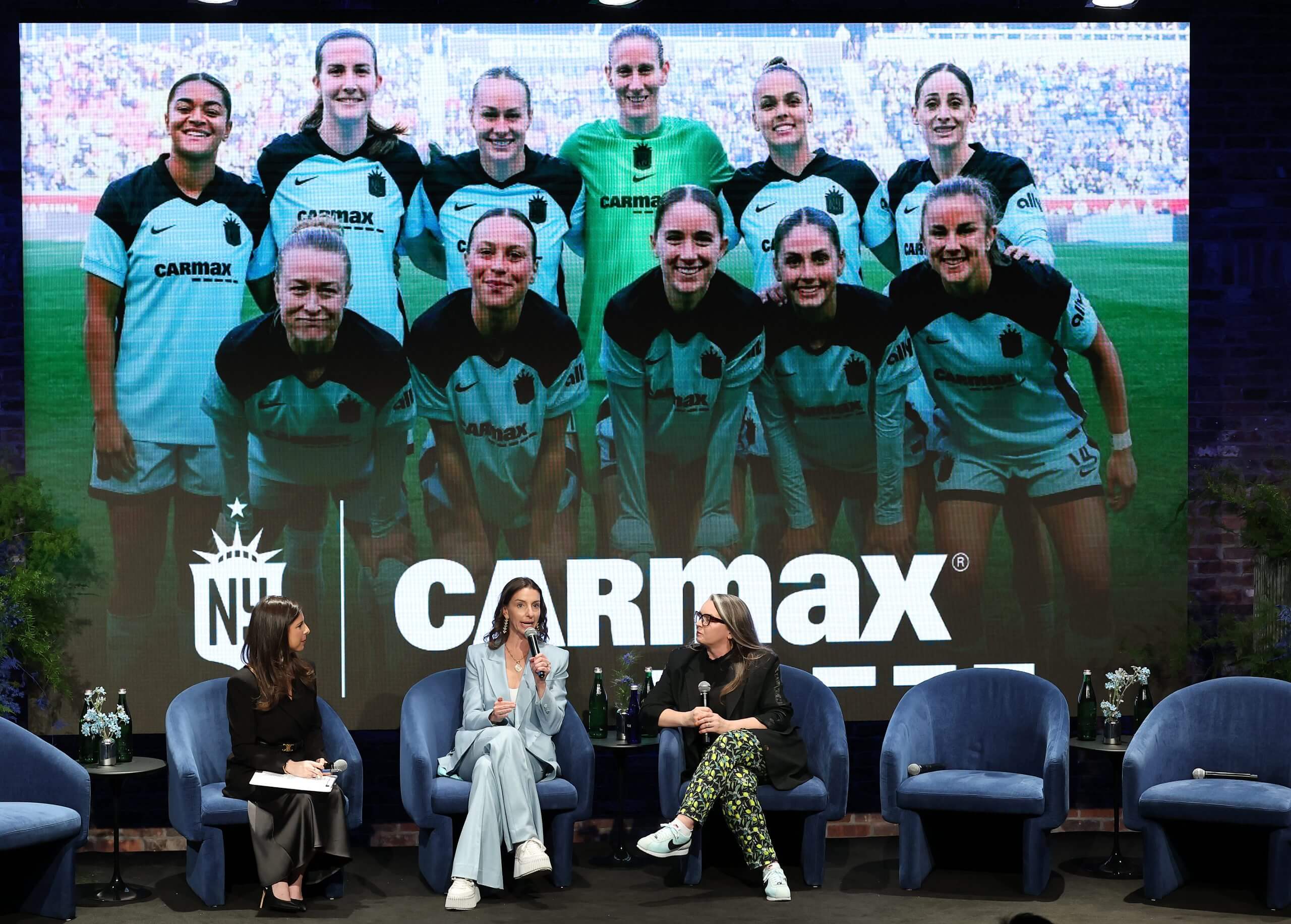
Tisch Blodgett led her family’s investment in Gotham FC (Elsa / Getty Images)
“Sports are part of my identity,” she says. “But what I loved even more than football was what it did to a community. People showed up in rain, in traffic, through good seasons and bad at the Giants. I want to build that in Gotham.”
When the family closed the deal, the confetti had barely been swept off after Gotham’s worst-to-first title run at Snapdragon Stadium in San Diego when they hoisted their first NWSL Championship trophy. There should have been a massive celebration for the underdog champions, but no flights had even been booked for the team to return home.
“There was very little infrastructure at the club,” Tisch Blodgett explained. Year one was basically triage. From computers to staff, they had to build everything from scratch. Year two has been an experiment on steroids to build a world-class club.
One of the first things she worked to do when she came on board was to build trust. She asked for the phone numbers of every player and called each one. “This is how I’ll lead,” she told them. “If I say I’ll do something, you have my word. You can come to me anytime and give me feedback.”
She now meets regularly with the leadership council and has upgraded medical support and mental health resources.
Next, she set out to create the atmosphere for the squad.
“This team deserves to play in front of 25,000 fans and to have every single person you know screaming their name,” she says.
Gotham’s roster boasts plenty of star power: World Cup winners Spanish forward Esther Gonzalez, USWNT midfielder Rose Lavelle and Emily Sonnet; Euro 2022 and 2025 winner with England Jess Carter; Germany’s Ann-Katrin Berger; and Olympic medalists and European and South American champions such as Brazilians Geyse, Bruninha, and Gabi Portilho.
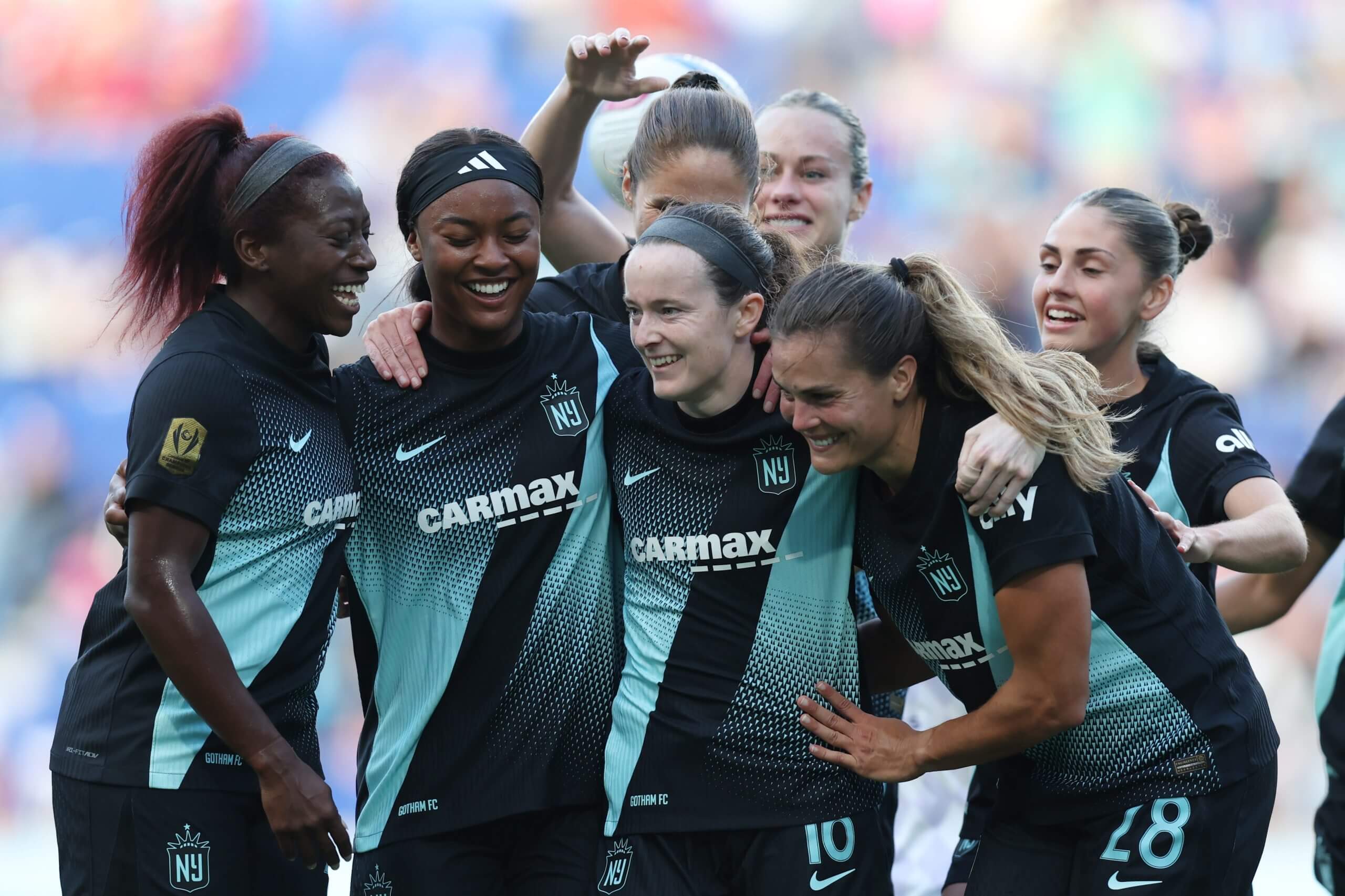
A World Cup winner with the U.S., Rose Lavelle, center-right, is one of many talented members of Gotham’s roster. (Ira L. Black / NWSL via Getty Images)
One of Tisch Blodgett’s main goals is to ensure her team plays in front of sellout crowds as a standard, not an occasion. This past regular season, Gotham averaged 8,892 fans, a 41 percent improvement from 2023. The total attendance was 115,598 during the regular season, a club record. Gotham was one of the four NWSL teams that had seen a rise in attendance this season. Last season, Gotham broke a club record during their playoff quarterfinal game, with 15,540 people attending — small but steady steps towards opening the second ring of Sports Illustrated more often.
Still, Gotham plays across the river from New York City, in Harrison, NJ, and Sunday travel is painful. Rather than shrug, the front office responded with charter buses and shuttles from the city, and a fan-experience redesign that stretches beyond the 90 minutes.
“That is very much in our DNA; we try new things because there’s no path we’re following. It would be much easier if there were. We need to keep experimenting and see what works,” she says.
Since the start of the 2024 season, Gotham doubled down on elevating the fan experience. The club has built a matchday atmosphere that works just as well for parents wrangling toddlers as it does for groups of friends looking for a full-day outing. From pregame fan fests — complete with face painting for kids and a pride game drag brunch— to lively halftime activations and an open invitation to “spend your afternoon” at the stadium.
In terms of business, since she took the helm, Gotham’s partnership revenue increased sixfold in under 24 months, the fastest growth in the NWSL.
That’s not because the club sells more advertising space on jerseys; it’s because the assets connect a brand to a mission and then prove it with data. Dove came on to be part of the “Keep Her in the Game” campaign, Gotham’s youth initiative aimed at the cliff where girls drop out of sports — especially around age 14. CarMax doubled its commitment after its media-mix modeling showed Gotham near the top for sales efficiency. Additionally, Gruns, LaCroix, Align, Tylenol, RWJBarnabas Health, Flamingo and Lendistry came as sponsors since 2023.
“We’re trying to become the first global women’s sports brand,” Tisch Blodgett says. That’s why she put together a team in the front office, led by former NWSL midfielder, now general manager, Yael Averbuch West. “The road will be bumpy. Sometimes it’ll feel like we’re going backwards, but now everyone knows what we’re building toward.”
She’s realistic about the league, too, both its potential and its math.
“No team is profitable today. The league isn’t either. But we (owners) all believe in this, and we’re investing. But sustainability has to come,” she says. That’s why she spends so much time on league work. If Gotham is the product, the NWSL is the platform. One fails without the other.
The mantra at Gotham is “always building, never finished,” she says. Players joke that, once in a while, “finished” might be nice. But building is the point.
Before the NWSL, women’s professional soccer in the U.S. lived through a series of ambitious experiments and abrupt endings.
The first major attempt came with the Women’s United Soccer Association (WUSA), launched in 2001 amid the afterglow of the U.S. women’s national team’s 1999 World Cup triumph. Despite its promise, the league folded two years later. A second chapter arrived in 2007 with Women’s Professional Soccer (WPS), which carried the torch until financial instability and internal disputes brought it down by 2012.
Between and around those efforts, smaller semi-professional circuits such as the W-League and the Women’s Premier Soccer League (WPSL) kept the game alive, sustaining the infrastructure, players and ultimately giving rise to the NWSL, which is celebrating its 13th season this year.
As the league grew, so did its valuations and ambitions.
Tisch Blodgett has grand plans for Gotham, but those do not involve building their own stadium, which has been the latest trend in the NWSL. Kansas City has a new home in CPKC Stadium, and 2026 expansion teams Denver Summit and Boston Legacy are following suit.
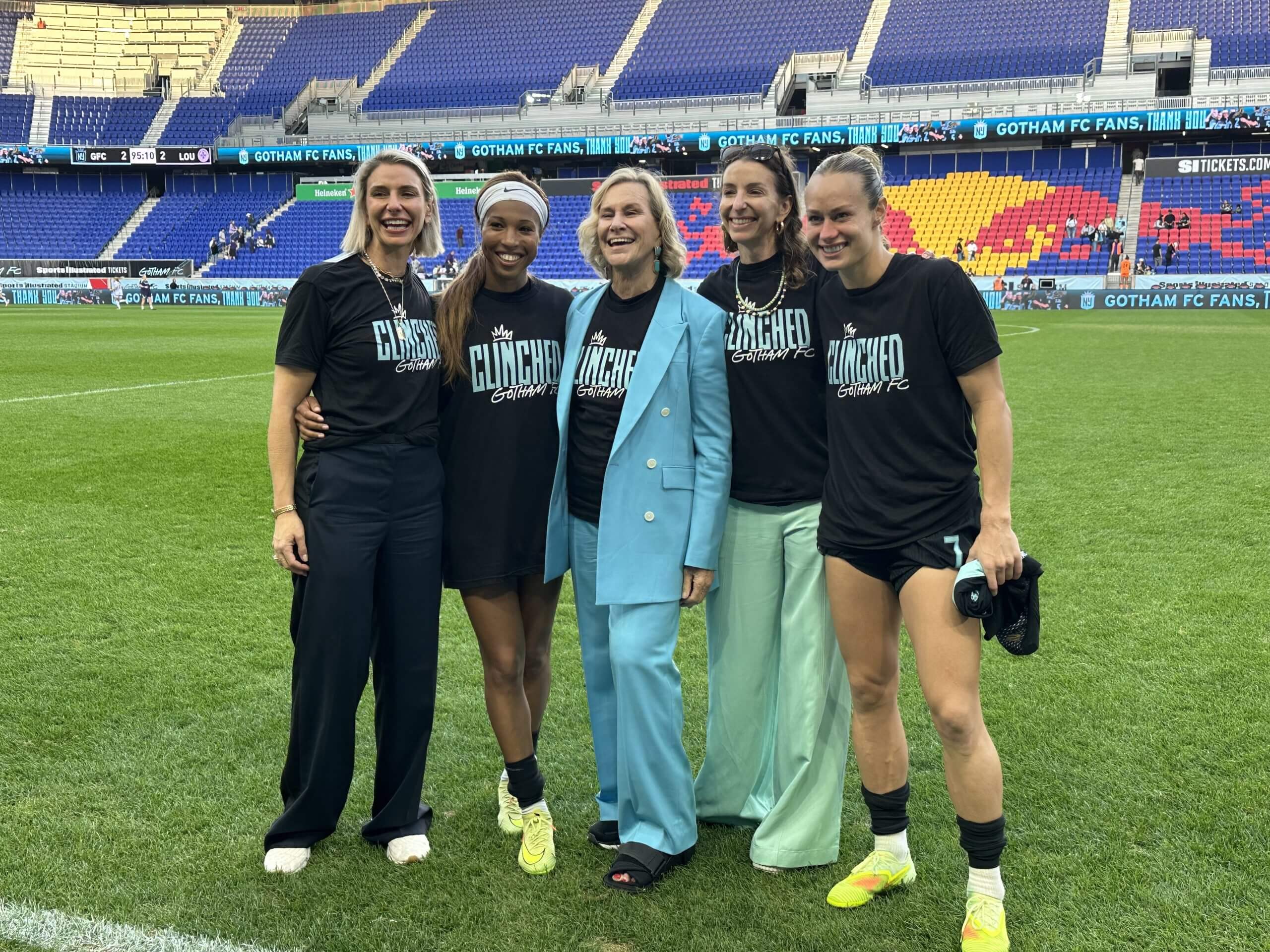
Carolyn Tisch Blodgett (second from the right) hopes to continue to build Gotham’s presence at Sports Illustrated Stadium. (Asli Pelit)
At the last regular-season home game, Tisch Blodgett spoke about how the new naming sponsor (Sports Illustrated) helped fans feel more at home on game day than before, when it was called Red Bull Arena, which Gotham shares with MLS’ New York Red Bull franchise.
She does not deny that scheduling control is real leverage, but she is also realistic. “Facilities are part of it,” she says. “But before we dream about 25,000 seats, we have to make sure the top deck is always open because demand warrants it. There are steps between here and a ribbon cutting.”
Game day for Tisch Blodgett is a ritual. She learned that choreography in the Giants’ owner’s box, where her grandfather set the tone. Family first, but invites matter. There are seating charts involved. She wears one of “many, many” blue suits in Gotham teal that are not Giants blue, and still laughs about her vegetarian childhood order at the stadium: a hot-dog bun with ketchup and sauerkraut. No, that is not a food group. Yes, she survived.
The family piece is genuine, not a marketing ploy. The cousins’ text thread lights up on game days. The hope is that Gotham becomes for this generation what the Giants were for the last: a weekly anchor that outlasts standings.
Nine-year-old Carolyn looked around Giants Stadium and saw a knitted community in every home game, rain or shine. Forty-year-old Carolyn looks around Sports Illustrated and sees the same thing.
Perhaps she’s no longer baking the pregame cake, but she knows the assignment hasn’t changed.

